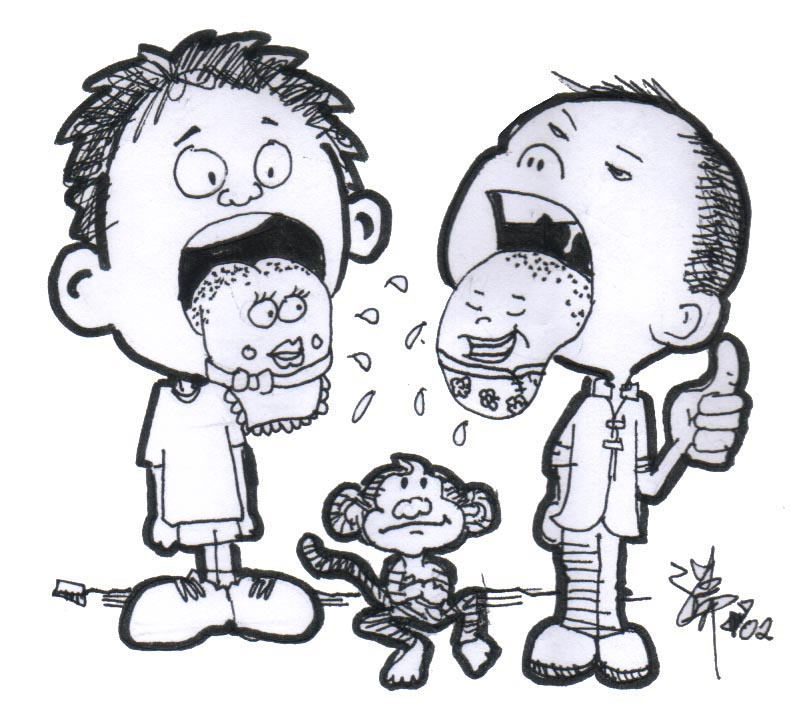First published in Tulay Fortnightly, Chinese-Filipino Digest, August 6, 2002, p. 11
Selbevußstein,” my philosophy professor intoned in that stiff, upper-lipped German way, and I was positively enamored. It reminded me of the time when as a child, I would pass by the Goethe Institute and wonder if I should study guttural German when I grow up. Well, I did grow up, and my fascination with languages remained.
I had always imagined myself speaking a dozen languages or so, spouting foreign words like a demented—but brilliant—UN interpreter. To me, learning foreign languages is not synonymous to learning how to say “I love you” in a hundred tongues or so. If I had a “Things To Do Before I Turn Gray and Old” list, I would have listed language learning as number one. I envied people who could speak several languages, so when I finally had the chance, I decided it was high time to learn a language or two.
I have since studied several languages, with Mandarin topping the list of course. I studied Mandarin for 13 years, yet, embarrassingly, have little to show for it. And then comes English, which is probably the foreign tongue that I am most proficient in. In grade school I tried studying Esperanto, the so-called “universal language.” Suffice it to say that I cannot remember the inventor of that language, much less the language itself.
And so I moved on to college, where Spanish is part of the curriculum. Please do not speak to me in Español, because I had a traumatic experience in Spanish class and, up to this day, can only say one thing in that language: “Yo soy guapa.”
I intend to go to work in Japan someday, so I went into the language of animé, Nihongo. I bought a set of instruction tapes and tried to learn the language. I am proud to say that after eight audio lessons, I can now confidently pop into any Tokyo pub and successfully order two bottles of beer. Biru ni hon, onegaishimasu.
But there are two tongues I didn’t have to study in order to learn: Hokkien and Filipino. Arguably, these are both dialects, but to me they are languages all the same. I cannot remember how I learned Hokkien and Filipino. I’ve been speaking these dialects since I was a child and I cannot remember—if there ever was any—who taught me. I certainly did not go to school to learn these languages. I could speak both dialects well even before entering nursery.
Neither did I read books to learn, like the way I did English. I began studying English through reading the “I Can See” series. It was something I never did to learn Hokkien or Filipino. My mother never sat me down to teach me the rudiments of these languages. Of course, I learned the Filipino alphabet in school, but I swear that I could speak Filipino straight even before I found out that Ka comes after Ba.
Characteristically speaking, the language that you grew up speaking is your mother tongue. This leads to a serious question: Which of these two dialects is my mother tongue? It would be easy to say that my mother tongue is Hokkien since it was probably the first language I ever spoke. But I cannot disregard Filipino. It comes naturally to me, without me having to pause and think for the right words to use.
Which language do I use more? I use both every single day. I speak to my parents in Hokkien, and to my friends and classmates in Filipino. Curiously, I speak Hokkien embellished with words like kasi, ano, baka and the like. In much the same way, I speak Filipino combined with words like siobe, ta-chia, sian-si that I have been so accustomed to using.
Perhaps the best way to settle this would be to say both are my tongues. I am as native a Hokkien speaker as I am a native of the Filipino language. Perhaps it is another reminder that I am Tsinoy. I am both Filipino and Chinese. Instead of choosing between the two languages, I am given the opportunity to have both. There is actually no conflict in this. As always, accepting the Tsinoy factor puts everything into place.
English is the language I use when writing my articles. I dream of someone who will someday say to me, “Anata wa hitori de wa arimasen.” I enjoy watching movies in Mandarin and I have to take up yet another grueling semester of Spanish. But somehow, these languages are not—and will never be—mine. I may eventually achieve success in learning these languages, but they will always be foreign, no matter how well I learn them. As for Hokkien and Filipino, I am proud to say that both languages are my mother tongue. Even if I eventually learn a dozen languages, there are only two that I can actually call my own.
What can I say to those who dream of being the ultimate linguist-cum-interpreter on earth? Ganbatte!





